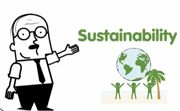Sustainability: Nature's Prescription for Business
Tom Wright on Sustainable Business PracticesI was first introduced to the concept of sustainability in my youth, by a man named Buckminster Fuller. I never thought that forty years later I would still be among a small minority of strategic planners and designers that are promoting and implementing systems thinking, and the introduction of the cyclical principle into every day life and every day business. Any other way is simply not sustainable. |
 |
Sustainable Business Practices
SUSTAINABLE because you strive for higher ambition levels than current practice, increasing eco-efficiency with a factor 4 or more. It is possible to do much more with much less energy throughput (waste). (Examples of Factor 4: 4 people commute in one car instead of 4 separate cars, or you double production with 1/2 the energy for the whole production.)
BUSINESS because you focus on economically feasible innovations of product/service/technology combinations, and organizational change. Business is education. Education is business.
PRACTICES because once you generate ideas and visions, then you follow through with detailed blueprints of sustainable business solutions. Each business has two or more "low hanging fruit" to choose, with excellent eco-efficiency gains.
Sustainable business practices (SBP) are about:
- Combining economy with ecology. The "green cell" wins. It is the green cell that adds value to the Earth's economy.
- Major innovations of new activities, instead of minor improvements of
existing activities. Organizational change is education. Educated people will design an eco-efficient business. The R.O.I. itself will be redesigned in order to give "credit" for pollution offsets ("lack of toxic waste"), and for long-term "benefit" that benign energy sources, such as solar, wind, and hydrogen energy sources, give the business.
- Fulfilling the essential needs of consumers and knowing future markets.
- Teaching an ideal of the "cyclic principle": waste for one system = food for another.
Sustainable business practices:
- Require strategic decisions within the company.
- Focus on the total range of innovation and organization of products, services, technologies and systems.
- Honor the cyclic principle of ecology, and see this hierarchy as essential: recycle, reuse, reduce, redesign for eco-efficiency.
Will not only be developed by bigger companies. Smaller companies with their innovative and dynamic character will be a major source of new SBP as well.
SIX STRATEGIES TOWARDS SUSTAINABLE BUSINESS PRACTICES
1. Creating new business: products, services and systems.
2. Developing breakthrough technologies.
3. Creating strategic partnerships; look for synergies throughout the supply chain of the business.
4. Creating new consumption, production and investment patterns.
5. Creating new ways of organizing business: organizational transformation to a learning organization.
6. Create ecoliterate leadership at all levels of the organization.

